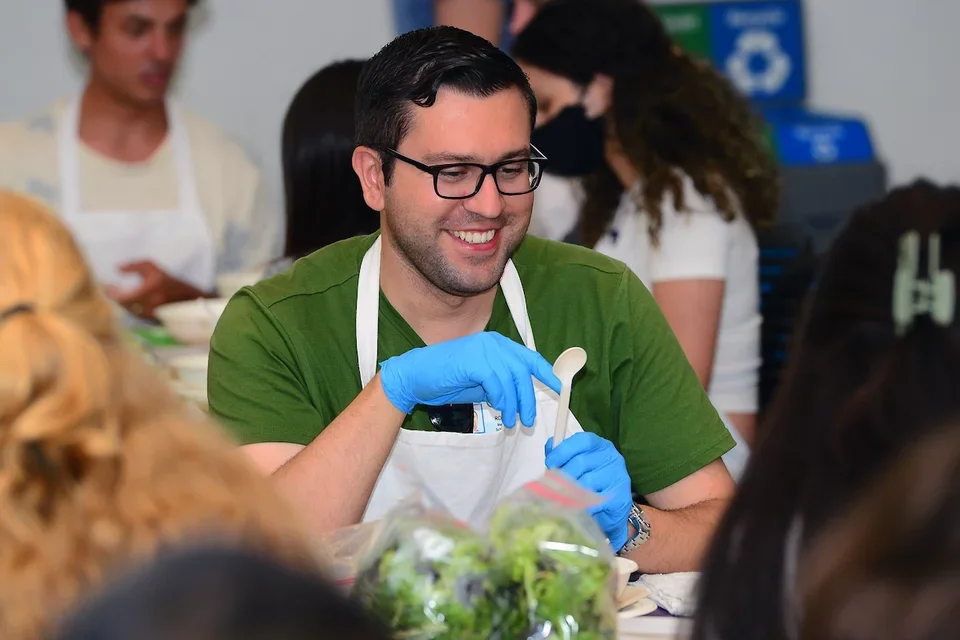What Is a Nutritionist?
Faculty Spotlight

A standard definition of a nutritionist might read something like this: A nutritionist is an expert in using food to improve health and to prevent and manage disease. However, as UCLA’s Vijaya Surampudi, MD, will tell you, reality is more complex.
Nutritionists play multi-faceted roles in the care continuum.
“Nutrition is the specialty that can help every other specialty,” she says.
Consider orthopedic surgery. The surgeons can’t operate if a patient’s body mass index (BMI) surpasses a certain threshold. Nutritionists might help that patient lose weight so they can have a critical surgery. People with head and neck cancer might have tumors affecting large portions of their face and mouth, leaving them unable to chew. Nutritionists can set those patients up with feeding tubes.
“Nutrition is so broad, it plays a role in any disease or specialty you can think of,” says Dr. Surampudi.
A Day in the Life of Dr. Vijaya Surampudi, Nutritionist at UCLA Health

Dr. Surampudi focuses on treating and preventing pre-diabetes/diabetes, high cholesterol, hypertension, obesity, heart disease, and other obesity-associated diseases.
An Assistant Professor of Medicine in the Division of Human Nutrition at the David Geffen School of Medicine at UCLA (DGSOM), Dr. Surampudi also serves on the physician team that runs UCLA Health’s Medical Weight Management Program.
She does different things for different patient populations every day, but she always keeps the same guiding question top of mind: How can we help?
Her clinic provides an essential service most do not: home nutrition assistance for enteral and parenteral feeding. They serve patients who need specialized nutrition support their primary-care physicians may not be comfortable handling.
For example, they teamed up with interventional radiology specialists to properly place feeding tubes before patients are discharged. By ensuring these patients receive proper nutrition, Dr. Surampudi and her colleagues promote a smooth healing process.
“We reduced the number of emergency room visits by 28%, just by creating this clinic,” says Dr. Surampudi.
(Feeding Tube vs IV Nutrition - What Is the Difference? Click the link to learn more...)

What Does a Nutritionist Do?
Nutritionists help people use food to improve health and to prevent and manage disease.
Dr. Surampudi’s work revolves around empowering people. She helps them understand and accept what they put in their bodies impacts their overall wellness, their disease outcomes, and their disease risks.
She finds it rewarding when her patients make lifestyle changes that, for example, help reverse diabetes or allow them to go off blood-pressure or cholesterol medications.
“It’s one thing to take a medication and call it control,” says Dr. Surampudi. “It’s another thing to make healthy choices, to actually take control of your life. That has a huge impact on a patient’s quality of life and how they view themselves.”
Her ultimate goal is encouraging patients to help themselves in the long run. That’s why she says a nutritionist’s job centers around education. They teach patients how to get results through time, effort, persistence, and above all, patience.
“Nutrition is a long-term commitment. There’s no instant gratification,” she says.
What Is the Difference Between a Dietitian and a Nutritionist?
People often use the terms “dietitian” and “nutritionist” interchangeably and casually. Anyone may call themselves a “nutritionist.” Dietitians must take exams and earn board certifications to call themselves registered dietitians.
The differences between dietitians and nutritionists need to be evaluated on a case-by-case basis. Consider each practitioner’s education, experience, and certifications.
Dr. Surampudi and her team are unique within the world of dietitians and nutritionists. They are board-certified physician nutrition specialists, a type of nutritionist who has completed medical training.
“We can use our skills as MDs to create tailored nutrition plans and even prescribe medications if needed,” Dr. Surampudi explains.
How to Become a Nutritionist
People thinking about becoming nutritionists should consider what clients they wish to serve and what environment they wish to work in. After making those foundational decisions, aspiring nutritionists should explore the certification and training paths most appropriate for their goals.
Dr. Surampudi became a nutritionist by accident. An endocrinologist by training, she grew absorbed by nutrition and its impacts while working in a diabetes clinic during her fellowship.
“I was working with diabetes patients and prescribing insulin to cover what they ate, but insulin causes weight gain. So I was in this chicken and egg situation,” she says. “But I knew if they adjusted what they ate, I would need to use less insulin.”
She realized this problem had a relatively straightforward solution: More patient education on nutrition.
“I started seeing a lot of care gaps in the realm of weight management and nutrition.”
Once she noticed these gaps, she couldn’t look away. Instead of practicing endocrinology, she decided to dedicate herself to nutrition—to filling those care gaps.
She ultimately wants to help as many people suffering from lifestyle-related diseases as possible. Each day, she finds new answers to the question she began asking in her earliest days as a nutritionist.
“How can we better use nutrition as a tool for medicine?”
FAQ for Future Nutritionists
How Much Does a Nutritionist Make?
According to the United States Bureau of Labor Statistics, the average annual salary for dietitians and nutritionists in the U.S. is $65,620. Actual salary figures vary widely depending on education, training, certifications, and practice type.
What Characteristics Make Someone a Good Nutritionist?
Dr. Surampudi says effective nutritionists are adaptable, good at listening, and willing to constantly learn and grow.
“Being adaptable is important because there are strong cultural aspects of food we need to be flexible about,” she says. “We also have to be willing to learn because nutrition guidance is often in flux; what we thought was correct ten years ago is not correct today.”
What’s the Best Thing About Being a Nutritionist?
Dr. Surampudi says her favorite part of being a nutritionist is helping people take control of their health through lifestyle choices.
About National Nutrition Month®
National Nutrition Month® takes place in March. The Academy of Nutrition and Dietetics created it to educate people about healthy eating and lifestyle choices and to empower them to make positive changes.



